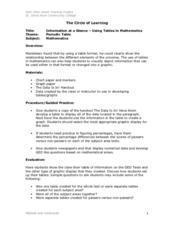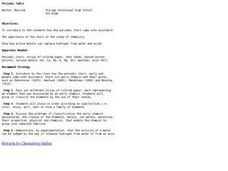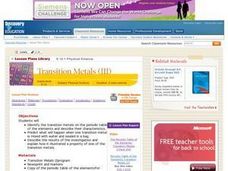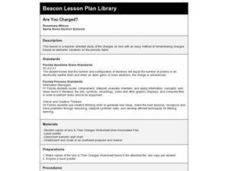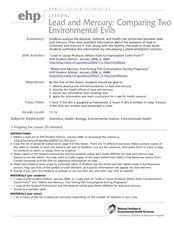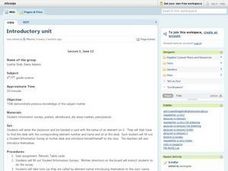Curated OER
Information at a Glance - Using Tables in Mathematics
Students create table to display GED Testing data located in paragraph provided by teacher, use information in table to create appropriate graph, and determine percentage difference between passing scores and failing scores.
Curated OER
Metals for Minting
Students study the Periodic Table to investigate basic properties of metals used to make coins. They discuss how historic events like the Civil War and Gold Rush had a direct impact on the trime.
Cornell University
What Happens When We Excite Atoms and Molecules?
Excited atoms lead to exciting lessons! Learners use heat and light to excite both atoms and molecules. They display their learning in the form of Bohr models depicting the excited state of the atoms.
Curated OER
Comparing Properties of Elements & Compounds
In this elements and compounds worksheet, students review the physical properties of different compounds and elements using websites for information. This worksheet has 1 graphic organizer and 1 short answer question.
Curated OER
Kalzium
Students explore an interactive program about the periodic table. They use the Kalzium software to dynamically explore the relationships between elements, the periodic table and properties of the elements.
Virginia Department of Education
Metals, Nonmetals, and Metalloids
How can one easily classify metals, nonmetals, and metalloids? Pupils answer this question as they experiment with unknown substances and perform tests on conductivity, brittleness, and malleability to determine which unknown belongs in...
Virginia Department of Education
The Modern Model of Atomic Structure
The difference between atomic mass and atomic number can be confusing for some young chemists. Help your class better understand the concepts by allowing them to sketch an atom on paper and then discuss their experience. Upon completion...
Curated OER
Students Get Animated: Make Existing Lessons Move and Motivate Students
Students study the chemical elements in a computer generated cartoon format. In this computer animation and chemistry lesson, students learn how to animate using computer programs. Students use animation to learn about the Periodic Table...
Curated OER
Periodic Table
Students identify the periodic table trends and predict material properties. They also design and conduct simple experiments and test material properties. Finally, students compare and contrast material properties and that chemical...
Curated OER
Why are Electrons Important?
Students write electron configuration of elements using atomic numbers and they identify valence electrons. In this electrons lesson plan, students observe a demonstration showing the space-filling property of an electron. They also...
Curated OER
Arranging the Elements
Students describe how elements are arranged in the periodic table. They compare metals, nonmetals, and metalloids based on their properties and on their location in the periodic table. Finally, students identify and describe the...
Curated OER
Transition Metals (III)
Students discuss transition metals, where they are located on the periodic table, some of the element in the group, and some characteristics of the group. They work in groups to conduct an experiment in which they mix transition metals...
Curated OER
Transition Metals (II)
Students discuss transition metals, their properties, and where they are located on the periodic table as well as why transition metals are ideal for coins. After discussion, they conduct an experiment using copper in the form of old...
Curated OER
Transition Metals
Middle schoolers identify and describe transition metals. They discuss alloys and their benefits. Students research one common, alloy, its composition, properties, and uses. They are asked for some common properties of most transition...
Virginia Department of Education
Average Atomic Masses
Facilitate learning by using small objects to teach the principles of atomic mass in your science class. Pupils determine the average mass of varying beans as they perform a series of competitive experiments. They gather data and...
Curated OER
Are You Charged?
Fourth graders study the charges on ions and familiarize themselves with a quick way to remember charges based on location of elements on the periodic table. They complete a worksheet and share their answers with the class.
Agency for Toxic Substances and Disease Registry
Don't Mess with Mercury (Lesson A)
Mercury is the only metal that is a liquid at room temperature. Teach your class this and many more interesting mercury facts by assigning an engaging task. A public relations activity, the exercise informs pupils of the hazards of...
Curated OER
Protons, Neutrons, and Electrons
Using the periodic table of elements, young chemists fill in a chart of isotopes to show the atomic number, mass, charge, number of protons, number of neutrons, and number of electrons. The chart is followed by 11 questions that...
Curated OER
Lead and Mercury: Comparing Two Environmental Evils
High schoolers in chemistry or health courses look at the material safety data sheet (MSDS) and periodic table of elements to gather information about mercury and lead, two toxic materials that have been found in food products. They read...
Curated OER
An Ad for an Element
Learners prepare an ad for an element, including properties and uses, in an attention getting format such as that used in the advertising business.
Curated OER
The Interactive Periodic Table of the Elements
Students study the different types of metals. In this investigative lesson students watch a demonstration on the effects of temperature on atoms and take a tour through baone matter.
Curated OER
Naming Elements and The Periodic Chart
Students will enter the classroom and be handed a card with the name of an element on it. They will then have to find the desk with the corresponding element number and name and sit at this desk. Each student fills out a Student...
Curated OER
Element Project
Ninth graders review and discuss the Periodic table and its 53 elements. They choose one element to become an expert on and then create a written Report in the form of a poster about their choosen element to be presented to the class.
Curated OER
Halogens
Students identify the elements that belong to the halogen family on the periodic table. In this chemistry lesson, students describe the common characteristics of elements in this group. They research about hydrochloric acid's effect on...


